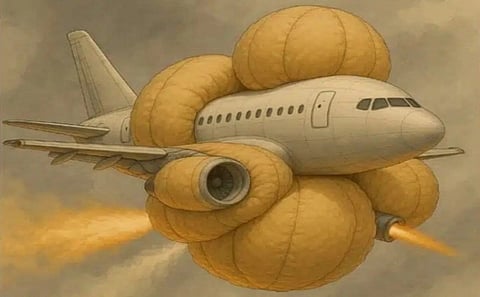‘Crash-proof plane?’ Engineers trial AI ‘airbag shield’ after deadly Air India crash
Could ‘airbag’ change flight safety? Experts say it could cut fatalities in future crashes

Dubai: An external, AI-powered “airbag” system for aircraft has been proposed as a pioneering safety solution following the June crash of Air India Flight 171, which claimed 260 lives. Experts say the unconventional concept could significantly reduce fatalities in future aviation disasters.
Engineers Eshel Wasim and Dharsan Srinivasan submitted Project REBIRTH to the prestigious James Dyson Award, inspired by the emotional impact of the June 2025 crash in Ahmedabad.
Project REBIRTH was born not in a lab, but from a moment of heartbreak,” the creators wrote, noting how the tragedy deeply affected their families—particularly Eshel’s mother, who could not stop imagining the fear passengers must have felt.
How Project REBIRTH works
The concept adapts airplane safety systems using AI and massive airbags. Key features include:
AI crash detection: Monitors altitude, speed, engine status, fire, pilot responses, and direction to make split-second decisions.
Automatic activation: If a crash is unavoidable below 3,000 feet, the system triggers automatically (pilot override possible).
Airbags: Rapidly deploy from the nose, belly, and tail in under two seconds to form a protective cocoon.
Impact absorption: Layered fabrics and smart fluids harden on impact to reduce injuries.
Descent control: Reverse thrust or gas boosters slow the plane if engines still work.
Rescue aids: Bright orange shell, GPS, infrared beacons, and exit lights facilitate post-crash evacuation.
The system aims to reduce fatalities, making crash survival possible even when catastrophic failures occur. REBIRTH can be retrofitted into existing aircraft or built into new ones.
Tragic inspiration
On June 12, Air India Flight 171 crashed just 32 seconds after departing Ahmedabad Airport en route to Gatwick, killing 260 people. A failure in the fuel system caused the plane to lose altitude rapidly, colliding with buildings. The tragedy drove the engineers to design a system to prepare for the worst.
James Dyson Award recognition
Project REBIRTH is now a finalist for the James Dyson Award, which highlights inventions with the potential to change the world. The creators describe it as the first AI-powered crash survival system that combines predictive analytics, impact absorption, and rescue features.
Social media reactions
Online responses have been mixed. Some praised the idea, writing, “If it works, let’s do it!” Others were sceptical, commenting, “Just build better planes,” or expressing concern about accidental deployment mid-air.
What’s next
The engineers plan to build working prototypes in laboratories. Their goal is for REBIRTH to be tested, approved, and implemented on real flights within five years, making survival in air crashes a standard safety feature.
Other James Dyson Award highlights
The award’s sustainability category was won by Aureus, a fluorescent material made from upcycled fruit and vegetable waste that harvests UV light and converts it into electricity. The invention, by 27-year-old Carvey Ehren Maigue from the Philippines, can be applied to buildings to generate renewable energy.
Sign up for the Daily Briefing
Get the latest news and updates straight to your inbox





